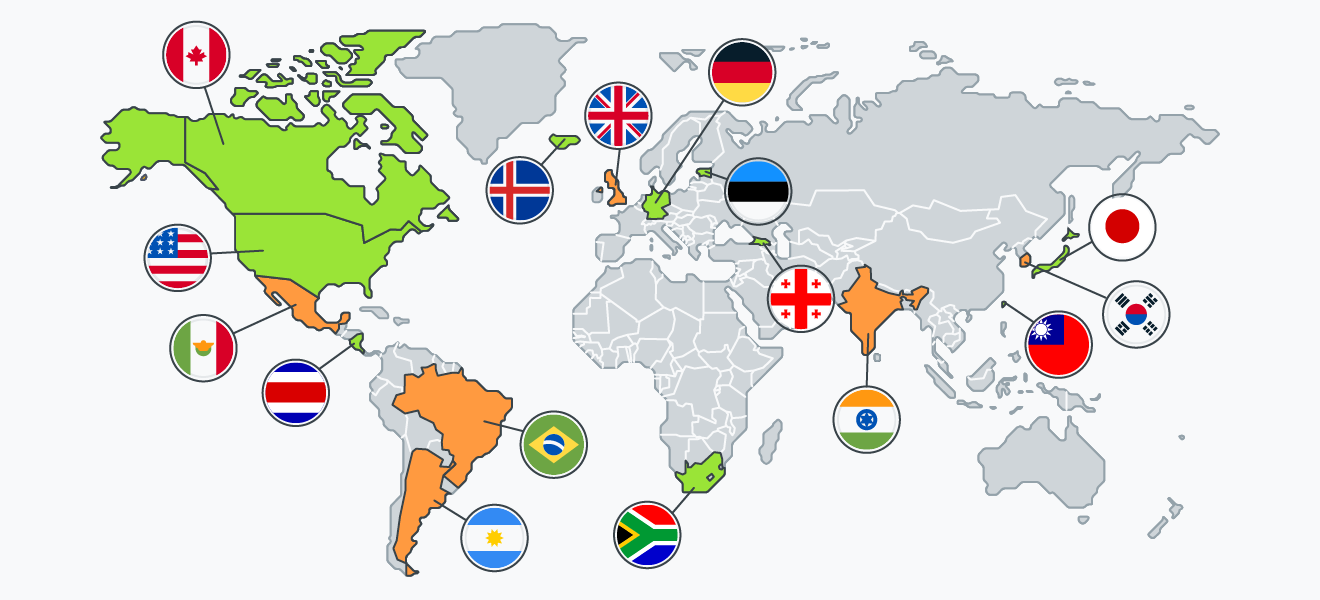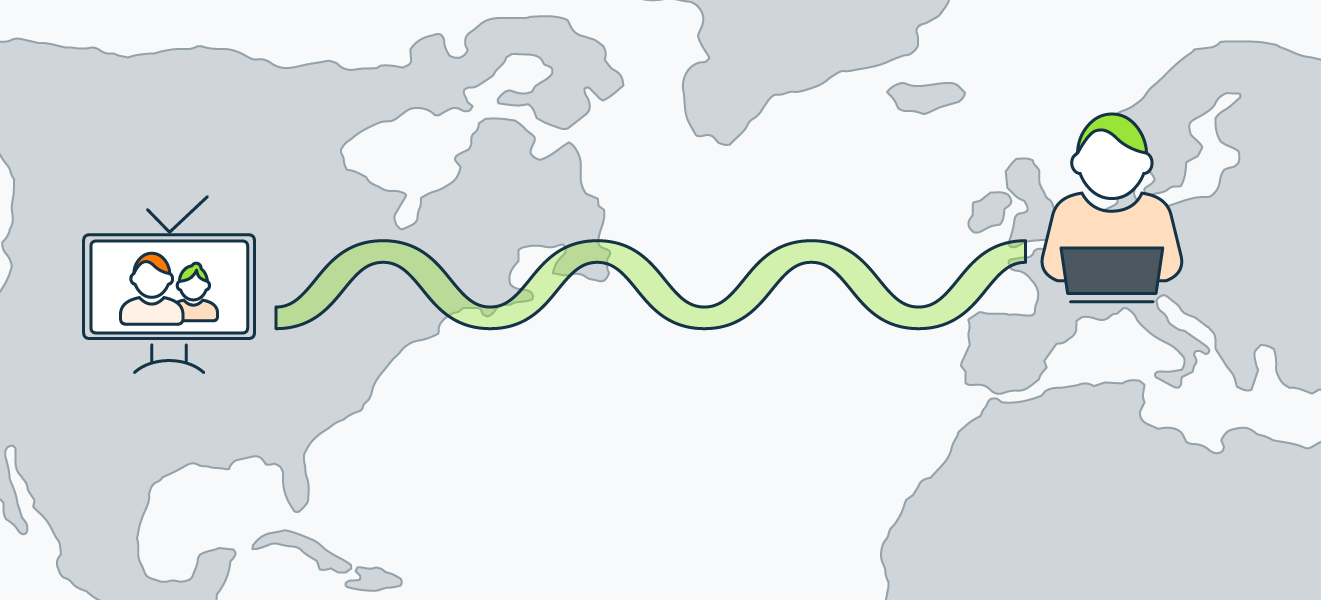Get privacy and unlimited content with Avast SecureLine VPN for Android
- Security
- Privacy
- Performance
When it comes to countries where VPN servers are located, not all are equal. Every country has its own internet laws and regulations around content and user privacy. And it may be better for you to connect to a VPN from certain locations where VPN servers offer more freedom. Read on to learn about the best server locations and countries to connect to a VPN.

The best country to connect to with a VPN depends on what you want to do online, as well as where you are. You’ll generally get faster connection speeds if you connect to a VPN server located closer to your actual location. And if you want to watch US Netflix shows, then you’ll need to use a USA VPN server.

This Article Contains:
While not every country may meet all your needs, the best countries for VPN servers have a wide range of content, high levels of internet freedom, and well-established privacy laws. Using a VPN in these countries means that most online content will be easily accessible and your privacy will be ensured.
Now let’s get to our list of the best countries to connect to a VPN server. To create this list, we used Freedom House’s annual report on internet freedom, which assesses countries based on obstacles to internet access, content limitations, and user rights. Depending on your location and specific needs, countries with higher levels of internet freedom are better to connect through with VPNs.
 The best countries for VPN servers, like those in green (or orange) above, have a strong culture of internet freedom and well-established privacy laws.
The best countries for VPN servers, like those in green (or orange) above, have a strong culture of internet freedom and well-established privacy laws.
Since 2016, Iceland has consistently topped internet-freedom rankings, and for good reason. The country places minimal restrictions on online content and has strong protections for user rights.
Among other legal protections granted to its internet users, Iceland has laws to protect whistleblowers and journalists, as well as strong freedom of expression protections. The country also allows data encryption tools, with no requirements for decryption.
Furthermore, residents of Iceland enjoy near-universal access, as you can connect from pretty much anywhere on the island. Depending on where you are, Iceland is one of the best countries to connect to a VPN server.
A small Baltic country, Estonia is well-known for its pioneering approach to e-government, making almost all government services easily accessible on the internet. The country’s progressive approach to internet governance extends to protecting user privacy and freedom on the internet.
Estonia boasts some of the strongest internet privacy protections in the world, and its Personal Data Protection Act (PDPA) establishes six legal principles that data processors must follow. The country also lets its residents see who’s accessing their information and what kind of information is being accessed.
Estonia has a highly transparent internet culture that prioritizes privacy and data protection, ensuring that people maintain control of their personal data.
Canada places third in Freedom House’s rankings for internet freedom. The country has a longstanding reputation of respect for civil liberties, and this is reflected in its strong internet privacy and protection laws.
Canada’s internet privacy protections extend to text messages and users of shared devices. Canadians can post or access the internet with few restrictions. The country supports net neutrality and requires ISPs (Internet Service Providers) to forward copyright infringement claims directly to users and prohibits them from demanding payment, settlement fees, or personal info.
All that means that Canada allows for greater access to content and protects those who unknowingly infringe copyright.
Internet access in Costa Rica is strong and the country has a free and open internet culture. Costa Rica has a long and stable democratic tradition, which means that freedom of expression protections are well established.
Internet infrastructure has been rapidly expanding, though its mobile internet network could use improvements. The country has widespread 4G internet access and has included plans for 5G access into its National Development and Public Investment Plan.
Costa Rica is a great choice to connect to a VPN server, especially if you’re located in or around the Americas. But the country’s internet infrastructure can be impacted during the rainy season or when there’s seismic activity.
Taiwan enjoys some of the freest access of all East Asian countries. Most websites and content can be accessed in the country, except for websites that promote illegal activity and some Chinese-based websites and services.
User privacy and personal data protections are strong in Taiwan and the use of encryption is also protected. That makes Taiwan a great choice to connect to a VPN server, especially if you're in the Asian region.
While Germany has experienced some problems with disinformation, like other countries on this list, it ranks high in overall internet freedom. The EU’s GDPR (General Data Protection Regulation) law as well as national legislation help maintain user rights and data privacy.
Since GDPR came into force, websites have been held to strict standards regarding how they handle user data. For instance, data collected in Germany cannot be transferred to foreign sites unless the countries that host those sites also comply with the GDPR.
To be sure, Germany’s government has recently stepped up internet surveillance and strengthened laws requiring ISPs to report illegal activity when detected. Nonetheless, all forms of encryption are legal and the country is still a great choice to connect your VPN through.
The United States may have been one of the first countries to enshrine freedom of speech into law, but it only makes it this high on our list because of political turbulence and the proliferation of misinformation online.
The United States still has a well-established tradition of protecting the open web, and it boasts unrivalled tech innovation. Few sites and very little content (with the exception of copyrighted content) is blocked in the US. But there are few legal protections for user privacy — most US-based websites extensively track users online, collecting large amounts of user data without their knowledge or consent.
While little has been done at the national level, some states like California have passed their own data protection laws, compelling businesses to disclose how personal data is collected and used.
Because the US has some of the widest streaming content available online, connecting your VPN through a US-based server will generally let you access the widest range of Netflix shows, for example.
Georgia ranks the highest of all Black Sea countries for overall internet freedom. While the country’s national communications commission restricts some content and has broad criteria for removing content, its regulations are typically enforced reasonably. Georgians enjoy few restrictions when accessing content and websites.
Internet users in Georgia also enjoy guaranteed privacy — a right protected by law and the country’s constitution. But privacy protections can be curtailed if people are suspected of illegal activity, and there is widespread concern over internet surveillance by the government.
Privacy protections are robust in Japan. The Telecommunications Business Act establishes the right to secrecy and prohibits telecoms carriers from censoring information. While there is an anti-piracy law, the government has a limited ability to block websites.
Like most other countries on this list, Japan’s government has expanded its ability to surveil the public, mainly in cases of criminal activity.
Overall, the internet in Japan is open, accessible, and can be browsed anonymously, making Japan a good choice when thinking about a server country to connect your VPN through.
South Africa leads all African countries in terms of internet freedom. While many residents still face obstacles to access, there are few restrictions on websites and privacy protections are firm.
In 2020, South Africa passed a data protection law, which includes safeguards for the processing of personal data. The law also outlines official procedures for the government when accessing private communications.
South Africa has few restrictions on encryption and anonymity. If you’re in the southern African region, South Africa is a good country to use for your VPN server.
Depending on your location and VPN needs, the next set of countries are also good choices when thinking about where to connect to a VPN server.
But in some of these countries, there may be additional content restrictions and user privacy may be weaker, due to increased government surveillance. Other countries here may have some general restrictions on VPN use, so consider your options carefully before connecting to servers located in the following countries.
Using a UK VPN is a great choice, and the country would be higher up on our list, if not for all the other great choices nearby. The UK places few restrictions on content and internet access and has strong laws protecting user privacy. Also, the UK government incorporated the EU’s GDPR into its own laws in 2018, so Brexit hasn’t weakened data protections in the country.
However, the UK has banned certain content or websites that were suspected of engaging in hate speech, terrorism, or other illegal activities. And if a site infringes copyright, UK law compels ISPs to block it. Still, a UK VPN is a good option.
Argentina ranks highest in terms of internet freedom in South America. Few websites or content are restricted to users, and users are free to use encryption. The right to privacy is also protected by law, including through Argentina’s own personal data protection law. But this right isn’t always honored, especially in the case of criminal activity, but also in more political instances.
Connecting to India via VPN can help open your browsing if you’re in a neighboring country with little internet freedom or privacy protections. But India restricts or bans access to many apps and websites freely available elsewhere, such as apps from Chinese companies like TikTok and WeChat as well as file-sharing sites and websites of political activists.
India also has fewer internet privacy protections. Indeed, technology companies are required to collect data, and the government can invoke a number of laws to access this data.
The use of encryption is also restricted and the Indian government is considering banning the use of VPNs.
South Korea enjoys a relatively free internet but has more restrictions than other, similarly free countries. For one, hundreds of thousands of websites were found to be blocked in South Korea — most for obscenity or legal reasons, as online content can be removed for broadly interpreted violations.
While South Korea does have internet privacy laws, protections have been eroded recently. Third parties can access users’ personal data, and the privacy of IP addresses is not protected by law. The government can also request content to be taken down and can surveil internet users without a court order.
The Brazilian government has a tradition of blocking or attempting to block websites and content it doesn’t like. And some communication apps, such as WhatsApp, have been blocked occasionally for not complying with information requests. ISPs are also required to retain users’ connection logs for 12 months.
But Brazil still may be your country of choice when connecting to a VPN server, because it’s the home to a wealth of content, including movies and TV shows, that may be difficult to access outside the country.
When it comes to accessing content, Mexico is generally free. Few websites are blocked or restricted, though there have been widespread cases of politically motivated content takedowns. Users are free to browse most websites that are accessible elsewhere.
Internet users’ privacy is also generally protected by law, but ISPs are required to retain records of user metadata for two years, and security agencies can have access to these records at any time. Limited online anonymity and surveillance, primarily targeting mobile phones, are also pervasive in the country.
A VPN server location can influence your internet speed, level of privacy, and ability to unblock content. Different countries have different internet and VPN regulations. While VPNs are legal in most countries, some countries regulate or restrict their use, which impacts whether the country is a good VPN location.
When it comes to watching TV online or streaming, licensing restrictions often limit the content that can be shown in certain countries. What’s freely available in one country may be blocked in another. Video content may also buffer more frequently in some locations than others.
 VPNs help you access content available in other countries, which is especially useful when traveling abroad.
VPNs help you access content available in other countries, which is especially useful when traveling abroad.
Additionally, in the case of VPNs, distance matters. The farther away a VPN server is located, the slower your internet speed will likely be. You can easily speed up your VPN connection by choosing a server location close to your own.
If you still have problems connecting, check if your VPN is working. You may have another problem that has nothing to do with location.
VPNs by nature allow for more private internet browsing. By choosing your VPN location, you disguise your actual location to whoever may be watching, whether advertisers or your local government.
If you’re looking for a VPN, Avast SecureLine VPN fulfills every need you can think of for a secure VPN. Avast SecureLine VPN offers 55 server locations to choose from all around the globe, and its Smart VPN feature automatically chooses the optimal server location for your needs so you can enjoy fast, private browsing immediately.
After you set up your VPN and log in, you’ll see a screen asking you to choose the location of the VPN server to connect through. Generally, servers located closer to your location offer faster connection speeds. But you should balance speed with other considerations, like the range of websites available and the country’s approach to internet freedom.
It’s often better to use a VPN than your regular internet connection. And compared to proxy servers and Tor, VPNs usually offer the fastest, most reliable secure connections. There are several reasons to use a VPN server address in another location, including:
To enhance your security and privacy.
To bypass geo-restrictions or government censorship.
To access blocked content.
To access video streaming services when travelling, such as Netflix, Disney+, Hulu, etc.
To test new software to ensure it works in different regions.
Avast SecureLine VPN provides a secure VPN connection wherever you are, protecting your IP address while offering bank-grade encryption.
And Avast doesn’t track the websites you visit or the content you consume, so your activity remains untraceable. And this all comes with lightning-fast connection speeds. Experience a more secure and more private internet today.
Download Avast SecureLine VPN for PC to access content freely, encrypt your internet connection, and stay private online.
Download Avast SecureLine VPN for Mac to access content freely, encrypt your internet connection, and stay private online.
Install Avast SecureLine VPN for Android to access content freely, encrypt your internet connection, and stay private online.
Install Avast SecureLine VPN for iPhone and iPad to access content freely, encrypt your internet connection, and stay private online.
Get privacy and unlimited content with Avast SecureLine VPN for Android
Get privacy and unlimited content with Avast SecureLine VPN for iPhone and iPad